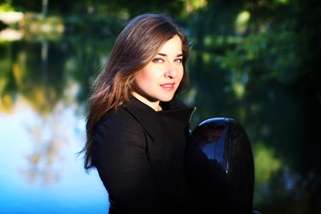|
Back
Ears Included: No Crayons Necessary New York
Avery Fisher Hall, Lincoln Center
06/06/2014 -
Andrew McManus Strobe (World Premiere)
Elliott Carter: Instances (New York Premiere)
Matthias Pintscher: Reflections on Narcissus (New York Premiere)
Alisa Weilerstein (Cello)
New York Philharmonic Orchestra, Matthias Pintscher (Conductor)

A. Weilerstein (© Jamie Jung)
The penultimate concert of NY Phil Biennial–a festival which one hopes won’t have to wait two more years for a repeat–was again a time of premieres in music and performers.
Matthias Pintscher, conducting his first New York Phil subscription concert, has been a familiar figure in New York as pianist, conductor, composer and now a Juilliard professor. Elliott Carter was a familiar face in New York for about 90 years, leaving us, alas, two years ago at the age of 104. But his final orchestral piece, a stunning work, was written just a few months before his death, and, like the philosopher Lucretius, he showed nothing except joy in being alive, not the least fear of the hereafter.
And while Andrew McManus is not a household name, this successful composer was one of the prized half-dozen out of 400 submitted works to the New York Philharmonic which won a public playing, leading off the three pieces last night.
This was a strange work, for the title promised strobe-light jumpiness, electro-dance drumming, shots of flames in the darkness. The work did include some of this, but more frequently, we had an Instagram of music. Lines which glowed for a few seconds, then evaporated. Hints of melodies which were heard no more. Muted trumpets made their calls, then disappeared into the landscape.
T.S. Eliot might have thought of Mr. McManus’ work, “In the auditorium, the notes come and go, talking of darkness, the occasional glow.” The piece was an enigma, and the mystery was sometimes striking.
But to me the most striking work of the evening was Carter’s Instances. Eight minutes long, and not a note was out of place. Conductor Pinscher had suggested we “take out our Crayons to connect the dots”. But why even bother to connect them? The dots, pinging and ponging by themselves spoke for themselves. They weren’t (or didn’t seem to be) mathematical. They were funny, quirky, from piccolo to contrabassoon, they became Ionescu dialogues, Paul Klee fancies.
Yet there was more. Possibly it was my imagination, but the solo trumpet calls throughout the work were reminiscent of Charles Ives’s The Unanswered Question. The string chorale at the end harked, more than coincidentally to Ives’s Central Park in the Dark.
Charles Ives was of course Carter’s first teacher. Yet Carter rarely produced anything as unsubtle as an homage. Could he have been thinking of Ives when he wrote Instances? It matters not. The piece was delightful by itself. A conversation among clowns and mimes, with that delicious smile which Carter always had whenever he attended his concerts...
And oh, how we all wish Elliott Carter had come onto the stage to acknowledge the New York Philharmonic. We can dream, but his dreams became a notational reality.
Matthias Pintscher did justice to both works. He needed no baton, for he, like Boulez, seems as precise a conductor as a composer. Juilliard is as lucky to have him as Columbia is fortunate to have Georg Friedrich Haas.
Pintscher’s own Reflections on Narcissus, a de facto cello concerto, performed by Alisa Weilerstein, should have been the most splendid experience. Ms. Weilerstein’s five dialogues with a most rambunctious orchestra was magnetic, spot on. A tirade in one section, a lyric in another, argumentative, and finally, as Narcissus apparently becomes the flower, with a soft reconciliation and a final harp pizzicato.
One question. It was difficult not to compare this with another cello concerto written as chapters from an epic tale. Richard Strauss’s Don Quixote (sorry, Mr. Pintscher) became a series of cello “variations”, not Mr. Pintscher’s five “reflections.” The philosophical Sancho Panza was played by a viola, the stupid figure here of Echo, was played by woodblocks and other chattering percussion instruments.
Richard Strauss was nice enough to relate us which sections of his story to which were listening. Mr. Pintscher, if not giving a narrative was giving us incidents dealing with age, recriminations and (good pun in the title) reflections. And oh, I am plebeian enough to want to know what exactly he was referring to.
In the long run (35 minutes worth), that was irrelevant. Mr. Pintscher’s piece was vast and symphonic, brilliantly scored, played with ardent feeling by Ms. Weilerstein, and conducted, of course, by one of this century’s true masters.
Harry Rolnick
|